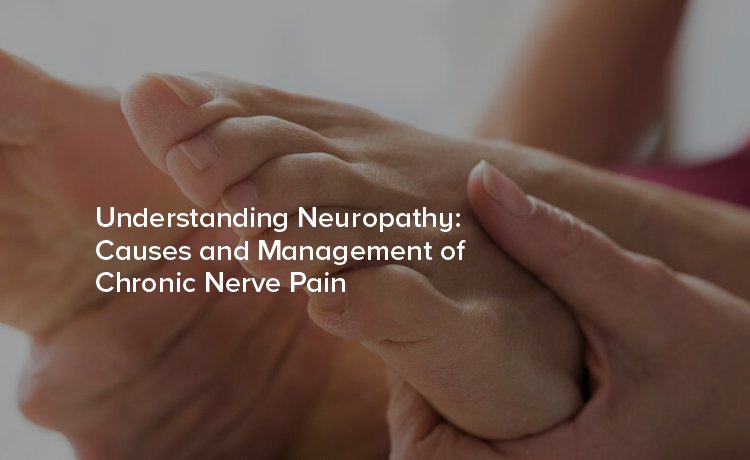
If you’ve experienced a sharp, burning pain that doesn’t seem to go away, or if parts of your body have felt unusually numb or tingling, you might be dealing with neuropathy. Chronic nerve pain can make everyday life challenging, affecting your mobility, sleep, and overall quality of life.
Neuropathy, also known as peripheral neuropathy, is a condition that occurs when there’s damage to the peripheral nerves outside of the brain and spinal cord. These nerves play a vital role in carrying signals between your body and brain—signals for sensation, movement, and even automatic functions like blood pressure regulation.
When these nerves are damaged, their signaling process becomes compromised, leading to pain, numbness, weakness, or other symptoms depending on which nerves are affected. Neuropathy isn’t a single condition but rather a broad term covering a variety of nerve disorders.
Neuropathy symptoms vary based on the type of nerves affected—sensory, motor, or autonomic. Below are some of the most common signs to look out for:
While these symptoms can be mild, untreated neuropathy can become severe and disabling. Prompt identification and management are essential.
There are multiple causes of neuropathy, ranging from underlying medical conditions to lifestyle factors. Below, we’ll break down some of the most common contributors:
1. Diabetes
One of the leading causes of neuropathy is diabetes, specifically diabetic neuropathy. High blood sugar levels can damage blood vessels that provide oxygen and nutrients to your nerves, leading to nerve degeneration over time. Roughly 50% of people with diabetes are estimated to develop some form of neuropathy.
2. Autoimmune Disorders
Conditions like lupus, rheumatoid arthritis, and Guillain-Barré syndrome can attack the body’s nerve tissues, resulting in nerve damage. These disorders often create inflammation that puts added stress on peripheral nerves.
3. Physical Trauma or Injury
Accidents, falls, or repetitive strain injuries can result in nerve compression or direct nerve damage. For example, carpal tunnel syndrome is a form of neuropathy caused by prolonged pressure on the median nerve in your wrist.
4. Alcoholism
Excessive alcohol consumption can lead to vitamin deficiencies (especially B-complex vitamins) and toxic nerve damage over time. This condition is often referred to as alcoholic neuropathy.
5. Chemotherapy and Medications
Certain cancer treatments, such as chemotherapy, can cause neuropathy as a side effect, often referred to as chemotherapy-induced peripheral neuropathy (CIPN). Other medications, including some antibiotics and antidepressants, may also contribute.
6. Hereditary Disorders
Some forms of neuropathy, like Charcot-Marie-Tooth disease, are inherited and may cause progressive nerve damage throughout a person’s life.
7. Other Underlying Causes
If you believe you may have neuropathy, a doctor will most likely take the following steps for diagnosis:
Early diagnosis allows for more effective treatment and helps prevent further nerve damage.
While neuropathy may not always be curable, several treatments can alleviate symptoms and prevent further nerve damage. Below are the most commonly recommended approaches:
1. Address Underlying Causes
Treating the root cause of neuropathy is often the first step. For example:
2. Medications
To manage chronic nerve pain, healthcare providers may prescribe:
3. Physical Therapy
Physical therapy can help strengthen muscles, improve coordination, and reduce discomfort for those experiencing mobility limitations.
4. Lifestyle Changes
Adopting a healthier lifestyle can significantly impact symptoms. Key adjustments include:
5. Complementary Therapies
Some individuals find relief through alternative or complementary treatments:
6. Support Groups & Counseling
Living with chronic pain can be isolating. Joining support groups or working with a counselor can help you cope emotionally while providing practical tips from others who've been in your situation.
While neuropathy presents challenges, proactive management can make a world of difference. By addressing underlying causes, working with healthcare professionals, and making lifestyle changes, many individuals find relief from symptoms and enjoy improved quality of life.
Dr M. Suneetha is one of the top medical oncologists in Gurugram. He has a vast experience of more than 30 years in the field of Medical oncology. He his specialised in treating leukemia,lymphoma, hematological oncology and other complex oncology cases . He is also specialised in Bone Marrow Transplantation (BMT) treatment. He is working as a Senior Consultant, HOD, Medical Oncologist in American Oncology Institute, Gurugram.